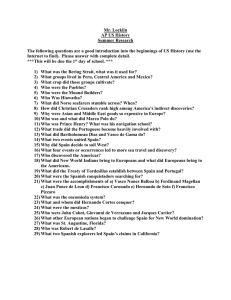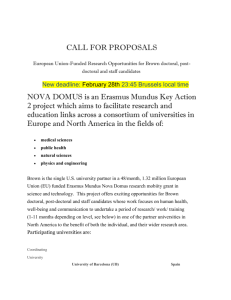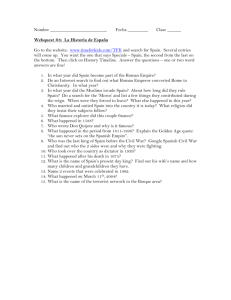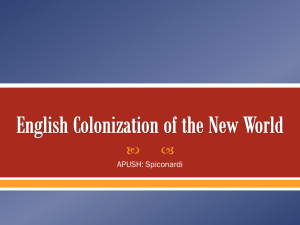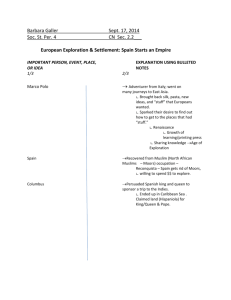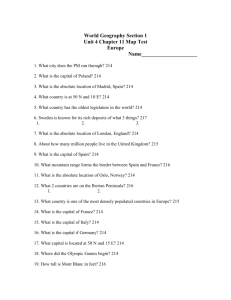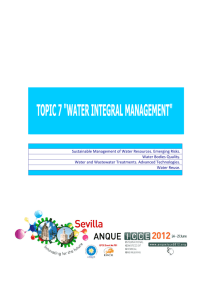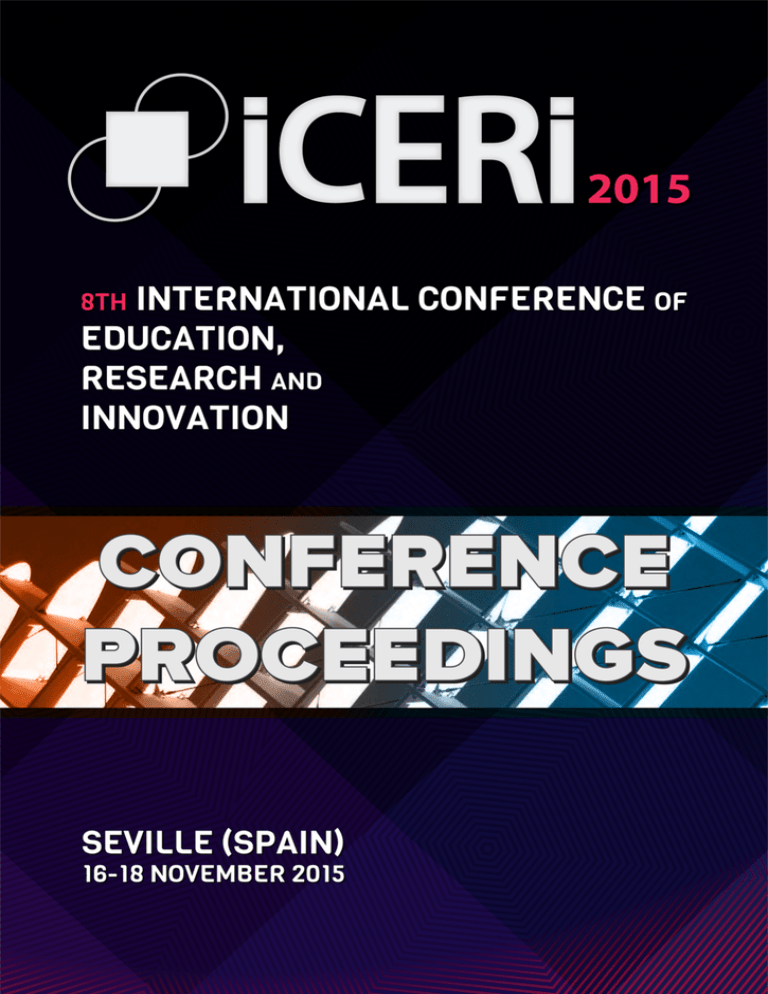
2015
INTERNATIONAL CONFERENCE OF
EDUCATION,
RESEARCH AND
INNOVATION
8TH
CONFERENCE
PROCEEDINGS
SEVILLE (SPAIN)
16-18 NOVEMBER 2015
Published by
IATED Academy
www.iated.org
ICERI2015 Proceedings
8th International Conference of Education, Research and Innovation
November 16th-18th, 2015 — Seville, Spain
Edited by
L. Gómez Chova, A. López Martínez, I. Candel Torres
IATED Academy
ISBN: 978-84-608-2657-6
ISSN: 2340-1095
Depósito Legal: V-2722-2015
Book cover designed by
J.L. Bernat
All rights reserved. Copyright © 2015, IATED
The papers published in these proceedings reflect the views only of the authors. The
publisher cannot be held responsible for the validity or use of the information therein
contained.
ICERI2015
8th International Conference of Education, Research and Innovation
WELCOME INTRODUCTION
Dear ICERI2015 participants,
It is a pleasure to welcome you all to this eighth edition of ICERI.
“Facing the challenges of Education” is the main theme of this year's ICERI, as it sets the
agenda for an in-depth discussion of the most important questions facing those in
education today: How education should be provided? What are the newest learning
methodologies? How can we learn in an innovative way? In a world of rapid
technological changes, how can we adapt to the changes in its due time?
All these questions and many more will be debated in the different interactive and
thematic sessions. They will provide an excellent opportunity to acquire skills and get
new ideas from different perspectives and innovative approaches in education around
the world.
Every year, ICERI intends to bring together educational experts from all corners of the
world. This year, it is a pleasure to welcome over 600 participants from more than 75
countries world-wide. This will ensure an international atmosphere that will enrich the
conference program and networking activities.
We hope that joining ICERI2015 will provide you with an opportunity to share your
experiences, learn from other educational innovations and meet new colleagues for
future cooperation.
Thank you very much for your participation at ICERI2015. We hope you enjoy your
time with us!
Thank you very much for your valuable contribution to ICERI2015!
ICERI2015 Organising Committee
ICERI2015
8th International Conference of Education, Research and Innovation
ICERI2015 COMMITTEE AND ADVISORY BOARD
Aaron Doering
Adolfo Tanzi Neto
Agustín López
Alessandro Bogliolo
Ali Merç
Amir Dirin
Amparo Girós
Ana Tomás
Andreas Fili
Andrew Youde
Ann-Nina Maksimainen
Antonio García
Benedict O'Donnell
Bernard Etlicher
Chelo González
Christos Rodosthenous
Connie Ng
Cristina Lozano
David Martí
Deborah Azaryad Shechter
Dorota Piotrowska
Eladio Duque
Emeka Emmanuel Obioha
Emmi Pakkala
Euisuk Jeong
Flaminia Del Conte
Florin Mihai
Fredy Olarte
Fumito Yoshikawa
Galina Molodtsova
Giles Pepler
Harald Haugen
Ignacio Ballester
Ignacio Candel
Ingibjörg Frimannsdottir
Inma Tomás
Ioana Carmen Paraschiv
Ismael Serrano
Iván Martínez
Javier Domenech
Javier Martí
Jean-Paul Becar
Joanna Lees
UNITED STATES
BRAZIL
SPAIN
ITALY
TURKEY
FINLAND
SPAIN
SPAIN
SWEDEN
UNITED KINGDOM
FINLAND
SPAIN
GERMANY
FRANCE
SPAIN
CYPRUS
SINGAPORE
SPAIN
SPAIN
ISRAEL
POLAND
SPAIN
SOUTH AFRICA
UGANDA
REPUBLIC OF KOREA
UNITED KINGDOM
ROMANIA
COLOMBIA
JAPAN
RUSSIAN FEDERATION
UNITED KINGDOM
NORWAY
SPAIN
SPAIN
ICELAND
SPAIN
ROMANIA
SPAIN
SPAIN
SPAIN
SPAIN
FRANCE
FRANCE
Jose F. Cabeza
Jose Luis Bernat
Juan Carlos Escalante
Kaye Price
Lilian Bacich
Lorena López
Luis Gómez Chova
Mª Jesús Suesta
Maria Porcel
Mario Pace
Martin Nordell
Mehmet Bardakçı
Melania Tera
Michelle Ellwood
Nadja Soldatic
Natalie Brown
Nicholas Peter Stanley
Nigel Atkinson
Nijole Putriene
Nilson Kunioshi
Norma Barrachina
Olga Teruel
Ozlem Zengin Unal
Pablo Opazo
Panadda Thanasetkorn
Paul Leslie
Peter Amosun
Peter Haber
Pierre Mora
Priscila Fernandes
Raine Valli
Rebecca Ferriday
Sergio Pérez
Sharon Judge
Slavka Tzanova
Smaragda Chrysostomou
Stephanie Linek
Svetlana Bekareva
Teodor Popa
Victor Fester
Wiley Davi
Xavier Lefranc
Zuzana Palkova
SPAIN
SPAIN
MEXICO
AUSTRALIA
BRAZIL
SPAIN
SPAIN
SPAIN
SPAIN
MALTA
FINLAND
TURKEY
ROMANIA
UNITED KINGDOM
SERBIA
AUSTRALIA
AUSTRALIA
UNITED KINGDOM
LITHUANIA
JAPAN
SPAIN
SPAIN
TURKEY
CHILE
THAILAND
UNITED ARAB EMIRATES
NIGERIA
AUSTRIA
FRANCE
BRAZIL
FINLAND
UNITED KINGDOM
SPAIN
UNITED STATES
BULGARIA
GREECE
GERMANY
RUSSIAN FEDERATION
ROMANIA
NEW ZEALAND
UNITED STATES
FRANCE
SLOVAKIA
ICERI2015
8th International Conference of Education, Research and Innovation
CONFERENCE SESSIONS
ORAL SESSIONS, 16th November 2015
Massive Open Online Courses (MOOC)
Meet the Keynote
Employability Issues and Trends (1)
Teacher Training Experiences
Assessment of Student Learning
Gender Issues in Education
Teacher Training in Foreign Languages
Experiences In Civil Eng. and Architecture Education
Social & Digital Media in Education
Advanced and Mobile Educational Technologies
Employability Issues and Trends (2)
Pre-service Teacher Experiences (1)
Game-based Learning
Inclusive Learning
Technology in Foreign Languages (1)
Experiences in Arts & Humanities Education
Digital Skills
Videos for Learning and Educational Multimedia
Workplace Training and Employability
Pre-service Teacher Experiences (2)
Collaborative and Project-based Learning
ICT in Special Education
Pedagogical Methods and Experiences (1)
Government Policy issues in South African Schools
e-learning Experiences (1)
Experiences in Programming and Computer Science Learning
ICT Skills and Workplace Learning
In-service Training and Professional Development of Teachers
Collaborative Learning Environments
Special and Inclusive Education
Experiences in Engineering Education
Teachers Leaders in an African Context
POSTER SESSIONS, 16th November 2015
New Trends and Experiences in Education
Teaching and Training Experiences
ICERI2015
8th International Conference of Education, Research and Innovation
ORAL SESSIONS, 17th November 2015
e-learning Experiences (2)
Technology in Teaching and Learning (1)
Adult and Vocational Education
Pedagogical Methods and Experiences (2)
Entrepreneurship Education Experiences
Experiences in Secondary and Higher Education
New Trends and Experiences in Postgraduate Education
Curriculum Design
Blended Learning
Technology in Teaching and Learning (2)
ICT in Adult Education
Problem Based Learning in Higher Education
Social Entrepreneurship
Cultural Diversity in Secondary Education
Links between Education and Research (1)
Experiences in Health Sciences Education
Flipped Learning & Flipped Classroom
Technology in Teaching and Learning (3)
Management and Organizational Issues in Education
Teacher Training in STEM Education
University-Industry Cooperation
Pedagogical Experiences in Secondary Education
Links between Education and Research (2)
Leadership and University Administration
Learning Analytics and Intelligent Tutoring Systems
Technology in Foreign Languages (2)
International Cooperation and Mobility Programmes
Professional Development of Teachers (1)
Non-formal Education
Technology Enhanced Learning in Primary and Secondary Education
Experiences in STEM Education
Government and Administration Issues in Secondary Education
New Trends in Online Learning
Foreign Language Learning
Accreditation and Quality in Education
Professional Development of Teachers (2)
Student Support & Tutoring
Experiences in Primary and Secondary Education
Barriers to Learning
School Leadership
POSTER SESSIONS, 17th November 2015.
Technology and Research in Education
New Challenges in Education
ICERI2015
8th International Conference of Education, Research and Innovation
VIRTUAL SESSIONS
Academic Research Projects
Accreditation and Quality in Education
Adult education
Advanced classroom applications and ICT Skills
Assessment of student learning
Blended Learning and Flipped Classroom
Collaborative and Problem-based Learning
Cultural Diversity and Inclusive Learning
Curriculum Design
E-content Management and Development
e-learning experiences
Education practice trends and issues
Education, Research and Globalization
Emerging Technologies in Education
Employability issues and trends
Ethical issues in Education
Experiences in Post-graduate education
Experiences in Primary and Secondary education
Experiences in Undergraduate education
Game-based learning and Gamification
Global Issues in Education and Research
In-service training and Professional development of teachers
International Projects
Language Learning Innovations
Learning and Teaching Innovations
Life-long learning
Links between Education and Research
m-Learning: mobile applications and technologies
Massive Open Online Courses (MOOC)
New Challenges for the Higher Education Area
Online/Virtual Laboratories
Pedagogical Methods and Innovations
Pre-service teacher experiences
Research on Technology in Education
Special education
STEM Education Experiences
Student Support in Education
Teacher Training experiences
University-Industry Cooperation
Virtual Learning Environments (VLE)
Vocational training
ICERI2015
8th International Conference of Education, Research and Innovation
ABOUT ICERI2015 Proceedings USB
HTML Interface: Navigating with the Web browser
This USB includes all presented papers at ICERI2015 conference. It has been formatted
similarly to the conference Web site in order to keep a familiar environment and to
provide access to the papers trough your default Web browser (open the file named
"ICERI2015.html").
An Author Index, a Session Index, and the Technical Program are included in HTML
format to aid you in finding conference papers. Using these HTML files as a starting
point, you can access other useful information related to the conference.
The links in the Session List jump to the corresponding location in the Technical
Program. The links in the Technical Program and the Author Index open the selected
paper in a new window. These links are located on the titles of the papers and the
Technical Program or Author Index window remains open.
Full Text Search: Searching ICERI2015 index file of cataloged PDFs
If you have Adobe Acrobat Reader version 6 or later (www.adobe.com), you can
perform a full-text search for terms found in ICERI2015 proceedings papers.
Important: To search the PDF index, you must open Acrobat as a stand-alone
application, not within your web browser, i.e. you should open directly the file
"ICERI2015.pdf" with your Adobe Acrobat or Acrobat Reader application.
This PDF file is attached to an Adobe PDF index that allows text search in all PDF
papers by using the Acrobat search tool (not the same as the find tool). The full-text
index is an alphabetized list of all the words used in the collection of conference
papers. Searching an index is much faster than searching all the text in the documents.
To search the ICERI2015 Proceedings index:
1. Open the Search PDF pane through the menu "Edit > Advanced Search" or click in the
PDF bookmark titled "SEARCH PAPERS CONTENT".
2. The "ICERI2015_index.pdx" should be the currently selected index in the Search
window (if the index is not listed, click Add, locate the index file .pdx, and then click
Open).
3. Type the search text, click Search button, and then proceed with your query.
For Acrobat 9 and later:
1. In the “Edit” menu, choose “Search”. You may receive a message from Acrobat asking
if it is safe to load the Catalog Index. Click “Load”.
2. A new window will appear with search options. Enter your search terms and proceed
with your search as usual.
For Acrobat 8:
1. Open the Search window, type the words you want to find, and then click Use
Advanced Search Options (near the bottom of the window).
2. For Look In, choose Select Index.
3. In the Index Selection dialog box, select an index, if the one you want to search is
available, or click Add and then locate and select the index to be searched, and click
Open. Repeat as needed until all the indexes you want to search are selected.
4. Click OK to close the Index Selection dialog box, and then choose Currently Selected
Indexes on the Look In pop-up menu.
5. Proceed with your search as usual, selecting other options you want to apply, and click
Search.
For Acrobat 7 and earlier:
1. In the “Edit” menu, choose “Full Text Search”.
2. A new window will appear with search options. Enter your search terms and proceed
with your search as usual.
THE PRODUCTIVITY EVALUATION OF INDONESIAN EDUCATION
UNIVERSITIES BY USING MALMQUIST INDEX IN THE YEAR OF
2010-2012
Handaru Jati, Moch Alip
Universitas Negeri Yogyakarta (INDONESIA)
Abstract
The research presented, documentary in nature, it aims to study techniques for analyzing the
productivity applicable to Indonesian education Universities. The methodology involves the collection
of information, organization, critical analysis, reflection, interpretation and synthesis of recent
literature. It is concluded that Malmquist index is innovative technique that focus on the assessment of
the technical productivity, possible to estimate the optimal production frontier of universities. The use
of these techniques allow real measures of academic processes, to determine the relationship
between the variables considered and consequently optimize the academic administration at
universities with innovation criteria. The results constitute an important basis for decision making by
the management teams of universities, in order to optimize innovation processes information criteria
Keywords: Productivity, university, Malmquist Index.
1
INTRODUCTION
Universities and non-profit entities need to make changes in their organizational structures that make
their decision centers modern and innovative. This management technique is needed to improve
resource allocation and contribute effectively to the decision-making process. In order to achieve this
goal, universities need a tool that is able to measures the profitability with which resources are
invested, considering in these entities, the objectives are not merely economic profitability and the
concept differs from that used in the business world. Productivity is an important aspect that needs to
be considered when evaluating management processes in university. In this sense the academic
managers require indicators that allow them to establish relationships or comparisons between the
various factors that make each of the academic units. For this process to be effective, it is important to
have a system of evaluation to measure the efficiency of the units considered productive. According to
Viloria et al (2009) [1] to measure productivity it is necessary to quantify the maximum product/work as
process efficiency and product/demand relationship as successful treatment outcomes. However,
when a functional relationship process between inputs and outputs are unknown, they are limitations
for evaluation. In response to the points made, what work has been done in education to measure
academic productivity using quantitative measures and how could be applied in Indonesian
Educaation universities? In response to these questions, it is intended in the research presented,
studying techniques for analyzing the productivity applicable to Indonesian Education universities. The
concept in solving this problem was first introduced by Malmquist [2] and has further been studied and
developed in the non-parametric framework by Caves et al [3], Fare et al [4, 5] and Cooper et al [6].
Malmquist Methods was first developed to measure the technical changes in Total Factor Productivity
(TFP) [4]. This method evolved to another field and service such as health [7], financial services and
banking [8]. The Malmquist index approach to productivity measurement has many advantages. It is
an index representing Total Factor Productivity (TFP) growth of a Decision Making Unit (DMU). This
index reflects (1) progress or regress in efficiency along with (2) progress or regress of the frontier
technology between two periods of time. It is based on multi input-output frontier representations of
the production technology [9]. Malmquist index is defined using a distance function by decomposing
the changes in total factor productivity into two interrelated components: changes in technical
productivity and technical efficiency. In the empirical context, the results are obtained using
mathematical programming techniques (DEA) that rely on minimum assumptions regarding the shape
of the production frontier. Finally, the index decomposes into multiple components to give insights into
the root sources of productivity change. DEA-based Malmquist productivity index measures the
technical and productivity changes over time.
Proceedings of ICERI2015 Conference
16th-18th November 2015, Seville, Spain
6134
ISBN: 978-84-608-2657-6
2
OBJECTIVE
Methodology consists of four phases: In the first phase of field research and documentation to obtain
database and concepts, theories, and background relevant to the measurement of productivity is via
Index Malmquist. In the second phase the variables objects of study are chosen in response to the
data. In the third phase of the data processing is done. Subsequently, in the fourth phase, analysis of
the results is made and the conclusions of the investigation are made. The data used in this work are :
(1) the number of student, (2) the number of academic staff, (3) the number of administration staff, (4)
the amount of university funding, (5) the number of study program, (6) the number of Doctor, (7) the
number research funded, (8) the number of journal and book published, (9) the number of community
service, (10) the number of graduated student during one academic year (11) the number of
accredited study programs, and (12) the number of patent. All of the data were taken from the
Institution Accreditation Report for year 2010, 2011 and 2012 and University annual report. In this
study The DEAP software has been used because this software has an output orientation and it is well
known that the orientation employed affects the results in terms of returns to scale [4, 10].
3
INTERPRETATION OF RESULT
After the critical and reflective review of the literature relevant to the subject of study, it is found that an
appropriate approach to analyze the productivity of the Universities is the Malmquist Index for
productivity, introduced by Caves et al in 1982 [3]. This is a relevant method for studying technical
productivity, and has an aim to measure the change in productivity in the same unit, between two
periods of time. A ratio greater than one indicates Malmquist productivity improvements, while if a
values less than unity it implies losses. Malmquist index decomposes productivity changes in technical
efficiency and changes due to technological progress between two time periods. Calculation to obtain
the level of productivity of the University Education in Indonesia performed using DEAP. Fig. 1 is the
initial view of the DEAP software.
Figure 1. Open Source DEAP
The twelve variables are bases for the calculations, and those are the number of student, the number
of academic staff, the number of administration staff, the amount of university funding, the number of
study program, the number of Doctor as an input, and the output for this work are the number
research funded, the number of journal and book published, the number of community service, (10)
the number of graduated student during one academic year the number of accredited study programs,
and the number of patent. The result of productivity index showed in fig. 2. 6135
Figure 2. Results of productivity calculation Process with the DEAP
Table 1 shows the changes of TFP relative to the input for the product and for the the year of 20102011, 2011-2012. It is noted that for the bienniums, the five universities with greater Malmquist Index
to one were UNDHIKSA, UNIMED, UNJ, UM, and UNNES. University with the lowest Malmquist index
was UNP, and the highest was UM in 2011-2012.
Table 1. Values of productivities for 2010-2010 and 2011-2012
Number
University
1
UNIMA MANADO
2
TFP 2010-2011
TFP 2011-2012
TFP average
0.76
1.171
0.9655
UNDHIKSA SINGARAJA
1.072
1.22
1.146
3
UNIMED MEDAN
1.183
1.048
1.1155
4
UNG GORONTALO
1.17
0.935
1.0525
5
UNM MAKASAR
0.99
1.062
1.026
6
UNESA SURABAYA
1.977
0.992
1.4845
7
UNJ JAKARTA
1.123
1.344
1.2335
8
UM MALANG
1.302
1.406
1.354
9
UNNES SEMARANG
1.259
1.115
1.187
10
UNY YOGYAKARTA
0.813
1.049
0.931
11
UPI BANDUNG
1.3
0.936
1.118
12
UNP PADANG
1.258
0.873
1.0655
The full of this study showed the followings: the universities that were technically productive,
UNDHIKSA, UNJ, and UM increased productivity during the two periods, while UNIMED and UNNES,
another productive units, productivity had decreased in 2011-2012. All other units had a difficulties to
achieved the productivity or maintain their productivity in standard.
6136
4
CONCLUSIONS
In this paper a study of techniques for analyzing the productivity applicable to Indonesian Education
Universities in the 2010-2011 and 2011-2012. The database used consists of six inputs and six
outputs from University accreditation report and academic year report. It was found that Malmquist
Productivity Index is appropriate and innovative technique that can be used in the performance
evaluation between universities, applicable to Indonesian universities. Their strengths are the ability to
provide useful information to improve the productivity of the organization, providing academic
managers tools that allow managers to establish the productivity variation measurement in a single
unit between two periods, and keeping fixed the reference technology; that is, that unity which is used
as reference optimum. Finally it is concluded that the use of these techniques allow real measures of
academic processes, to determine the relationship between the variables considered and
consequently optimize the academic administration at universities with innovation criteria.
REFERENCES
[1]
A. Viloria, C. Vasquez, and M. Núňez, "Use of the data envolvent analysis to determine the
correct management of the economic resources of a country," in 2nd International Conference
on Adaptive Science & Technology ICAST: IEEE, 2009.
[2]
S. Malmquist, "Index numbers and indifference surfaces," Trabajos de Estadistica y de Invest
Operativa, vol. 4, pp. 209-242, 1953.
[3]
D. Caves, L. Christensen, and W. Diewert, "Multilateral Comparisons of Output, Input and
Productivity using Superlative Index Numbers," The Economic Journal, pp. 73-86, 1982.
[4]
R. Fare, S. Grosskopf, and C. A. K. Lovell, Production Frontiers. Cambridge: Cambridge
University Press, 1994.
[5]
R. Fare, S. Grosskopf, B. Lindgren, and P. Roos, " Productivity Developments in Swedish
Hospitals : A Malmquist Out," 1994.
[6]
W. W. Cooper, L. M. Seiford, and K. Tone., Data Envelopment Analysis: A Comprehensive Text
with Models, Applications, References and DEA-Solver Software. Boston: Kluwer Academic
Publishers, 2007.
[7]
J. Ventura, E. Gonzalez, and A. Carcaba, "Efficiency and Programâ€Contract Bargaining in
Spanish Public Hospitals. ," Annuals of Public and Cooperative Economics, vol. 75, pp. 549573, 2004.
[8]
J.-E. Sturm and B. Williams, "Foreign bank entry, deregulation and bank efficiency: Lessons
from the Australian experience.," Journal of Banking & Finance, vol. 28, pp. 1775-1799, 2004.
[9]
A. Charnes, W.W. Cooper, and E. Rhodes, "Measuring the efficiency of decision making units,"
European Journal Operation Research, vol. 2, pp. 429-444, 1978.
[10]
L. M. Seiford and J. Zhu, "An investigation of returns to scale in data envelopment analysis,"
Omega, vol. 27, pp. 1-11, 1999.
6137

